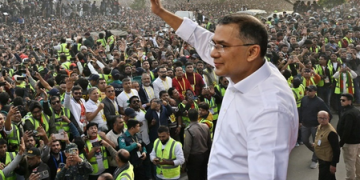An American scholar has written a book in which he tries to explain China’s recent rise. Dan Wang’s thesis is that China is a society of engineers and its government is the rule of engineers, as compared to the US, which he classifies as a society of lawyers. China is good at manufacturing and building things, he says, while the US is not. So why is this the case?
The answer is regarding the choices that the Chinese state has made, especially in 2015 when it laid out the ‘Made in China 2025’ plan. Sometimes these choices do not work, as Wang points out. An engineering-led mindset produced China’s brutal lockdown in Shanghai or unacceptable things like the one-child policy. But it is also why China has succeeded in industrial policy at the highest level: high speed rail, renewable energy, electric vehicles, ship-building and has caught up in aviation, semi-conductors, rocketry and artificial intelligence.
In all these areas, what the state has intended to achieve, it has delivered. This is an interesting theme and we will keep returning to it in this column. Today I wanted to ask ourselves the same question: What has the Indian state intended to achieve and has it been successful in doing this?
On the side of the economy, jobs and, especially, foreign policy, the answer is now clear and on both sides of the argument the debate is only about who is to blame. That does not concern us here today. Let us look at an area where the Indian state has succeeded in the choices it has made.
This month was passed the Rajasthan Prohibition of Unlawful Conversion of Religion Bill, 2025. It is aimed at two things: criminalising interfaith marriage between Hindus and Muslims and preventing people, particularly the marginalised communities from becoming Christians.
Like with other laws of this type, the Rajasthan law punishes conversions but not all of them. It says: ‘If any person re-converts to original religion i.e. ancestral religion, the same shall not be deemed to be a conversion’ and explains ancestral religion as ‘the religion in which forefathers/ancestors of the person had faith, belief or was practiced’.
Readers will not need to be told what this means because it is clear. This phrasing was introduced to us in the first law of our era on this subject. This was the Uttarakhand Freedom of Religion Act, 2018. It was followed by laws in Himachal Pradesh (2019), Uttar Pradesh (2020), Madhya Pradesh (2021), Gujarat (2021), Haryana (2022) and Karnataka (2022).
All of these laws were passed by the BJP. The Rajasthan law adds something new. It also has criminalised all forms of propagation. It says that the dissemination of information, ideas, or beliefs through media, social media and messaging applications is unlawful if this is interpreted as propagation of religion intended for conversion.
It also increases punishment, now being at up to 14 years in jail and 20 years, if the person changing faith is Dalit or Adivasi. All of these BJP laws are in violation of pretty much the entire panel of fundamental rights, but they have become acceptable in our society. It will be the rare reader, even of this column, who knew about the Rajasthan law cleared on 9 September because this is no longer news as our TV debates understand that word.
To tie the argument up, it is important to accept that the state has succeeded in achieving what is set out to do. Politically, it is difficult to reverse the laws because socially they have been made acceptable. The number of people either in favour of these laws or disinterested in them outnumbers those who are in favour of their repeal.
The Karnataka law came into effect on 17 May 2022. Like the others, it requires people wanting to convert to give 30 days’ notice to the district magistrate. The bureaucrat will then put the application up on a notice board in his office and in the office of the tehsildar, calling for objections.
After it won the Assembly elections in May 2023, the Congress said it would undo this law. The following month, 15 June, news under this headline was published: ‘Siddaramaiah-led Karnataka government withdraws anti-conversion law.’
That did not happen. A few days ago, on 8 September, it was reported that the government ‘will seek legal opinion on the Karnataka Protection of Right to Freedom of Religion Act, popularly known as the anti-conversion law, and decide on further action.’
Meaning that the law is still intact. The state under the BJP made some choices on behalf of Indians beginning in 2014 and resulting in laws on beef that began in 2015, on freedom of religion which began in 2018, on citizenship which began in 2019 and on other things linked at ending pluralism and targeting minorities.
It has achieved what it has intended to achieve here. We may not have had a ‘Made in China 2025’ policy and whatever unserious efforts we have made on this and other fronts have flopped. But it is hard not to accept the total victory of the ‘Remake India 2025’ policy, whose fruits we can see in the laws, the media and indeed in the society all around us.
By Aakar Patel






































